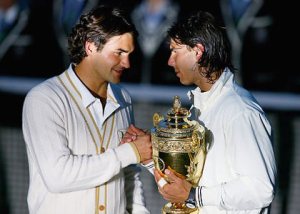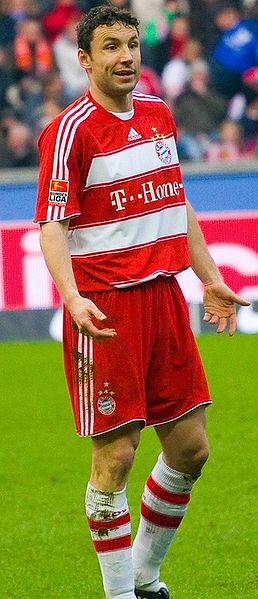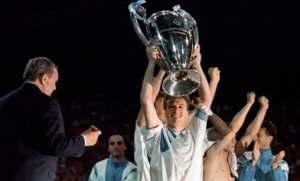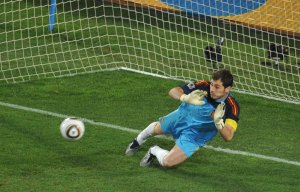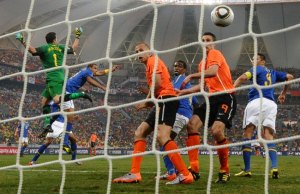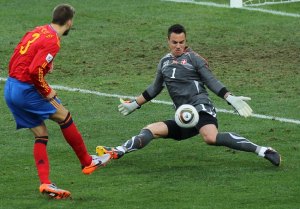it’s quite a few months ago, now. 8 months, to be exact. louis van gaal and josé mourinho were at the sidelines in the year’s second most important final of the year. in the bernabeu, their clubs bayern munich and internazionale milan were playing the final. and those two trainers seemed so different; here the tall and pretty big dutch, there the shorter and smarter looking portuguese.

van gaal won the champions league with ajax in 95, eliminating bayern with a 5x2 in the semifinals...
actually, there not that different at all. and not at all trendy, either. everywhere in europe, the young coaches with clear concepts, humble but firm image and smart sentences are taking over more and more clubs; the money is short, and suddenly the coach becomes a more important figure to make the little money invested give out the maximum output. but mourinho and van gaal are different; and, to a certain agree, alike.
both had great success early in their career, with clubs that shouldn’t had it. mourinho formed a great fc porto team, which one the uefa cup and the champions league in the early 2000s; van gaal won the uefa cup and the champions league with ajax amsterdam almost a decade earlier. both counted on young and still unknown players, which all became pretty famous in their later career. both used the chance to get to a bigger club; mourinho joined english giants chelsea, van gaal went to fc barcelona. both had immediate national success, but difficulty to repeat european glory. this is were the career parallel ends. and where their story begins.

van gaal and mourinho working together at barcelona.
when van gaal was in barcelona, he made his translater josé mourinho his assitance coach. how were these two ego-maniacs able to work together? well, one was the boss, and in the position to be generous – van gaal loves to be generous, and he even gave mourinho full coaching opportunities. the pupil went on to work for fc porto, and the “master” was called by the dutch federation when barcelona didn’t want him anymore. we’ll come back to that, later.

mourinho beat van gaal in the champions league final last may.
van gaal had a historical football disaster as holland’s chef coach, and the netherlands didn’t qualify for the 2002 world cup. for van gaal, it was back to the beginnings after a few years out of business. he started at az alkmaar – and got them very close to the title in 2008, and to the title in 2009. there was no doubt, he was a fantastic football teacher. and he got his dream job back to a top club, at bayern munich, where they were looking for a football teacher.
mourinho was still having national success, now with inter in the serie a, but not in europe. little did the two men know that they would meet in may 2010, in the bernabeu, where mourinho now works.
one can say that the pupil has surpassed the master. career-wise, having coached chelsea, inter and now real madrid. in the champions league final, beating bayern 2×0. the duel is still on, but what do these two friends have in common?

mourinho, a winner for fc porto, too. and beloved!
mourinho and van gaal are completely convinced of their superior knowledge in all things football. everyone around, including journalists, get the idea that they’re amateurs, compared to these one-man-shows. real madrid is a huge club with gigantic history, and has stars like cristiano ronaldo, kaká, casillas and özil, but they are completely overshadowed by mourinho. he is the club, and he needs it to be that way. when something doesn’t work his way, be it outside or inside the club, the press will know. and the power is in his hands.
van gaal tends to make everyone around him feel a little dumber, too. he has that effect on people, since he is very convinced of his vision of football and of all of his decisions. he listens to others, but at the end he’ll do what he thinks is right, which normally remains unchanged. this is what he has in common with his former protegée – a high opinion of his abilities, with results to back it up. these coaches are becoming rare, but both van gaal and mourinho dominate their respective scenes.
but this is where we come to the differences, which are quite a few. it starts with the view of the sport: mourinho is more pragmatic and wants to win at any cost, even at cost of “beautiful football”; of course, he too likes the game played well, but he prefers to just simply win matches. both chelsea and inter got a reputation for playing defensively, on the fast counter-attack – and that’s how inter beat bayern in the 2010 champions league final. some say that he can’t do that in real madrid. mourinho says that will work with whatever player material he has, but at the end, real is mourinho – until he leaves (which he loves to play with, the idea of leaving). van gaal, on the other hand, wants to win and dominate; he is always in search of the perfect game, his teams always play with ball possession and try to attack. the normal system is to tire the opponents in the first half, and to finish off the match in the second.
another philosophical difference is that of players. mourinho is confident enough that he will remain to be the main star, so he is always in search for players that are ready to go in and win titles. van gaal prides himself in giving young players their first chances, many times against public and even internal opinion. the list of players he’s put on the pitch first is very long and extremely prominent. it’s part of what he does best. so he doesn’t really like big stars in his club, some say because he has to be the biggest star.
another difference is the leadership style. although both are absolute aplha-types, it seems that mourinho gets along better with the players; he seems to be able to communicate with them better, speak their language, motivate and convince them. he’s from portugal (were the wanting to win gene was developed), van gaal is dutch (domination and beautiful game); the success gives van gaal reason, the actual playing, not the communication off-field. van gaal is funny in his own way, but he has no closeness to players, simply because he’s not good at it. they all respect him, but they don’t love him like mourinho’s players do. this might be the biggest difference. both have total support within their squads currently, but everyone who leaves bayern has no warm words for van gaal (mostly players from southern countries).
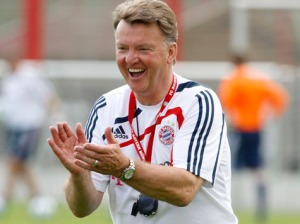
having problems with his boss: van gaal and uli hoeness.
a further and final difference is the clubs their working for. real madrid has had lots of success with the philosophy of building up and international star team and winning glorious titles. it was like that in the 50s, and it still is like that now. so there is no “real” philosophy outside of buying, and the buying of mourinho is another example for that. this allows mourinho to totally dominate the team, since it has no historical values or traditions, per say – besides winning at any cost. bayern munich is very different, and quite unique in europe. club president uli hoeness, bayern president karlheinz rummenigge and manager christian nerlinger are all ex-players at bayern and for germany. hoeness has been at the club since the 60s, and the club is not used to having someone from the outside being a “one-man show”. louis van gaal is always very direct about his thoughts, and journalists, although slightley afraid of him, know how to take advantage. hoeness and van gaal will never become friends, and it might seem that the german is preparing a premature exit for his great dutch coach if the results don’t come. van gaal has become a coach that will only be able to stay if he has success – exactly what happened to him at barcelona. that’s spain’s only team with a tradition of how they want to play football, and some other values. they didn’t like van gaal’s natural arrogance, but he won them two la liga titles in a row. when it seemed who wouldn’t manage a third, he was fired; and that after bringing forth andres iniesta, carles puyol and victor valdez, amongst others. he did make the mistake of bringing in a bunch of dutch players and fighting with the biggest star (rivaldo), which he didn’t do at bayern. and i, as a bayern fan, would like van gaal to stay as long as possible. he’s just that good, and the players know it, too. but it seems that he can’t really control his ego in moments he should.
the funny thing is that both mourinho and van gaal are really nice guys, and most journalists will confirm this. funny, interesting and extremely capable of doing their job. but where for one, the one-man-show is part of his success story, for the other, it might be, once again, his downfall.

mourinho = real madrid
bayern will meet inter in the round of 16 of this season’s champions league. real madrid will try their revenge on olympique lyon, who eliminated them last season. interesting matches, for sure. and maybe a next step to a revenge in the final, between van gaal and mourinho?
